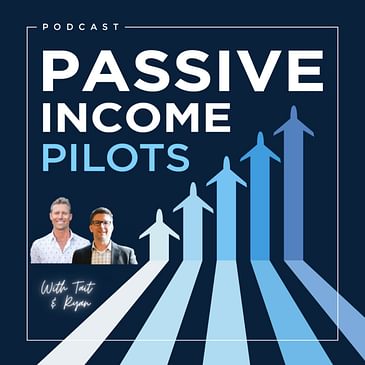Welcome to another episode of Passive Income Pilots! This week, your hosts Tait Duryea and Ryan Gibson are thrilled to bring you an insightful conversation with private equity mogul Collin Hathaway of Skylight Capital, a seasoned entrepreneur specializing in business acquisitions. In this episode Collin shares his journey from buying his first plumbing company in 2008 to building a multi-million-dollar business empire. Discover how pilots can capitalize on the wave of baby boomers retiring and selling their high-cashflow blue-collar businesses. Whether you're looking to invest passively or actively take over a business, this episode is packed with valuable insights and practical advice.
Timestamped Show Notes
(00:00) - Introduction and welcome by Tait Duryea and Ryan Gibson.
(06:00) - Meet Collin Hathaway: Background and journey in business acquisitions.
(10:39) - Private Equity 101: Breakdown of private equity sectors and leveraged buyouts.
(14:00) - The Blue-Collar Business Opportunity: Baby boomers retiring and market dynamics.
(21:53) - Finding and Evaluating Businesses: Resources and initial evaluation tips.
(25:46) - Conducting Due Diligence: Steps and practical advice on due diligence.
(33:35) - Financing Your Acquisition: Options including SBA loans and seller financing.
(37:36) - Day-to-Day Management: Transitioning ownership and managing operations.
(44:00) - Building a Positive Company Culture: Importance and Collin's approach.
(49:00) - Interviewing and Hiring Best Practices: Effective interviewing tips and resources.
(50:57) - Fun Stories and Final Thoughts: Memorable stories and final advice from Collin.
Referenced Materials
What You Learn Acquiring 12 Home Service Companies
From False Starts To $100MM+ in Revenue...TWICE
Building a Recession Resistant Business
#59 - The Silver Tsunami: Dwayne Clark on the Future of Senior Living Investments
---You've found the number one resource for financial education for aviators! Please consider leaving a rating and sharing this podcast with your colleagues in the aviation community, as it can serve as a valuable resource for all those involved in the industry.
Remember to subscribe for more insights at PassiveIncomePilots.com!
Join our growing community on Facebook
Check us out on Instagram @PassiveIncomePilots
Follow us on X @IncomePilots
Get our updates on LinkedIn
Have questions or want to discuss this episode? Contact us at ask@passiveincomepilots.com See you on the next one!
Legal Disclaimer
The content of this podcast is provided solely for educational and informational purposes. The views and opinions expressed are those of the hosts, Tait Duryea and Ryan Gibson, and do not reflect those of any organization they are associated with, including Turbine Capital or Spartan Investment Group. The opinions of our guests are their own and should not be construed as financial advice. This podcast does not offer tax, legal, or investment advice. Listeners are advised to consult with their own legal or financial counsel and to conduct their own due diligence before making any financial decisions. The hosts, Tait Duryea and Ryan Gibson, do not necessarily endorse the views of the guests featured on the podcast, nor have the guests been comprehensively vetted by the hosts. Under no circumstances should any material presented in this podcast be used or considered as an offer to sell, or a solicitation of any offer to buy, an interest in any investment. Any potential offer or solicitation will be made exclusively through a Confidential Private Offering Memorandum related to the specific investment. Access to detailed information about the investments discussed is restricted to individuals who qualify as accredited investors under the Securities Act of 1933, as amended. Listeners are responsible for their own investment decisions and are encouraged to seek professional advice before investing.

